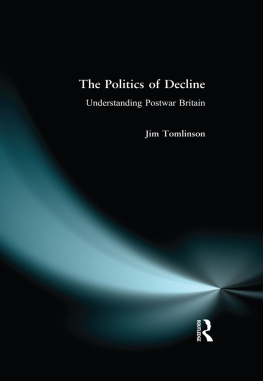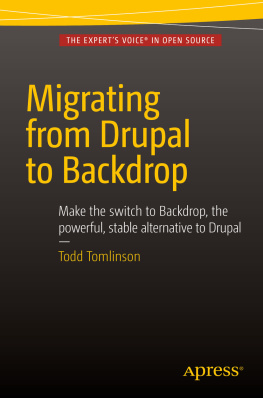First published 2000 by Pearson Education Limited
Published 2014 by Routledge
2 Park Square, Milton Park, Abingdon, Oxon OX14 4RN
711 Third Avenue, New York, NY 10017, USA
Routledge is an imprint of the Taylor & Francis Group, an informa business
Copyright 2001, Taylor & Francis.
The right of Jim Tomlinson to be identified as the author of this Work has been asserted by him in accordance with the Copyright, Designs and Patents Act 1988.
All rights reserved. No part of this book may be reprinted or reproduced or utilised in any form or by any electronic, mechanical, or other means, now known or hereafter invented, including photocopying and recording, or in any information storage or retrieval system, without permission in writing from the publishers.
Notices
Knowledge and best practice in this field are constantly changing. As new research and experience broaden our understanding, changes in research methods, professional practices, or medical treatment may become necessary.
Practitioners and researchers must always rely on their own experience and knowledge in evaluating and using any information, methods, compounds, or experiments described herein. In using such information or methods they should be mindful of their own safety and the safety of others, including parties for whom they have a professional responsibility.
To the fullest extent of the law, neither the Publisher nor the authors, contributors, or editors, assume any liability for any injury and/or damage to persons or property as a matter of products liability, negligence or otherwise, or from any use or operation of any methods, products, instructions, or ideas contained in the material herein.
ISBN 13: 978-0-582-42368-8 (pbk)
British Library Cataloguing-in-Publication Data
A catalogue record for this book is available from the British Library
Library of Congress Caialoging-in-Publication Data
A catalog record for this book is available from the Library of Congress
Set by 7 in 10/12 pt Times
I am grateful for comments on various aspects of the arguments of this book to the late Alec Caimcross, David Edgerton, Martin Francis, Deborah Mabbett, Nick Tiratsoo, Mike Kenny and Richard English. I have also received valuable comments from seminar participants at Brunei University, the Institute of Historical Research, the University College of Wales at Aberystwyth, and the Economic History Society conference at Leeds University, April 1998. An earlier version of appeared in Economic History Review 49 (1996). Thanks also to Isobel and Anders for help on the IT front.
The publishers wish to thank the following for permission to reproduce material: , 6.2 and 6.3 from Economic Outlook 47 (Tables R11, R15 and R14 respectively), Organization for Economic Co-operation and Development, 1990.
We have been unable to trace the copyright holders of material used in and would be grateful for any information that will enable us to do so.
Chapter 1
The importance of decline
The rise and decline of nations and empires has long been a seductive way to write about the past. Gibbons famous account of Rome in these terms has been followed by many later authors, who have applied similar terms, and often similarly moralistic arguments, to every powerful state from ancient Greece to modern America.
Central to most of this kind of declinology is a focus on the place of individual states in the world system of power; it is global strategic and political capacity relative to others that measures rise and decline. Kennedy, like many others, sees this power status as closely linked to economic strength, but it is a countrys ability to make itself felt in world politics that is the key measure of performance. In this view, economic performance is a problem mainly if it is inadequate to support great power ambitions.
A largely separate but equally voluminous literature exists about British economic decline, which treats this perceived failure of performance as a problem in its own right, not usually attaching much importance to explaining why economic performance should be regarded as so significant. This kind of work concentrates its efforts on explaining why, on a range of measures, Britain has at various times since the late nineteenth century fallen short of the economic achievements of other nations. Usually the existence of this decline is more or less taken for granted, with perhaps just a few figures of GDP performance used to establish the case; the central question posed in this literature is, why has it happened? This book is essentially about this second notion of decline.
Whether as an account of world history over centuries or millennia, or as a local account of Britain in the twentieth century, the framework of decline cannot be treated as an innocent description of the past. The use of the term necessarily organises our thinking into particular channels, and pushes us towards certain ways of looking at the world. So we need to step back and ask, where does the term come from, and what are the effects of using it? As Barry Supple puts it, declinism is an ideology, and like all ideologies has a history.







